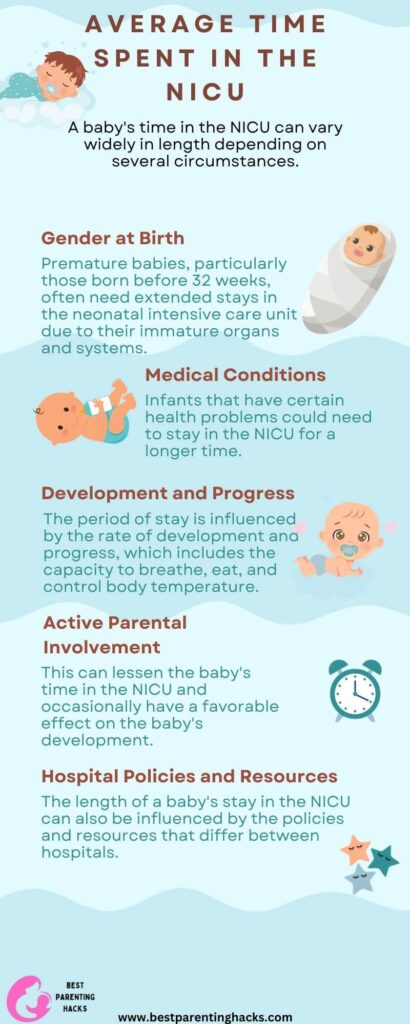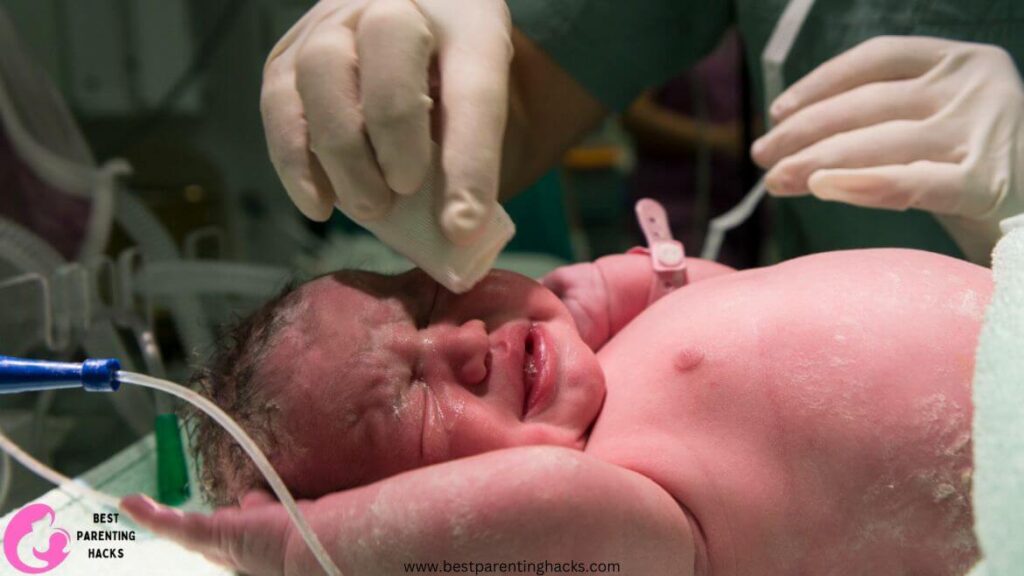Table of Contents
Every family’s route through having a baby in the Neonatal Intensive Care Unit (NICU) is filled with a variety of emotions and experiences. As a parent who has experienced this, I am aware of the mixture of love, worry, and hope that envelops the heart. The NICU is a world where each moment matters and every little accomplishment is acknowledged, not simply a place. This essay is a sincere attempt to help parents through this difficult but worthwhile journey by providing guidance, information, and support. It’s about getting to know the NICU setting, accepting the mental rollercoaster, and discovering the subtleties of this unique kind of care. We’ll talk about how long a baby stays in the NICU on average, how important it is for parents to be involved, and how to deal with the many obstacles that come up. We’ll also discuss the vital role that medical professionals play and the important adjustment that comes with taking your kid home. This journey is about the lifetime effects it has on families, not simply the days and weeks spent in the NICU. It’s a tale of tenacity, wisdom, and deep love.

Average Time Spent in the NICU: What to Expect
A baby’s time in the NICU can vary widely in length depending on several circumstances.
- Gender at Birth: Because of their undeveloped organs and systems, premature babies—especially those born before 32 weeks—frequently require prolonged stays in the neonatal intensive care unit.
- Medical Conditions: Infants that have certain health problems, such as infections or respiratory distress, could need to stay in the NICU for a longer time.
- Development and Progress: The period of stay is influenced by the rate of development and progress, which includes the capacity to breathe, eat, and control body temperature.
- Active Parental Involvement: This can lessen the baby’s time in the NICU and occasionally have a favorable effect on the baby’s development.
- Hospital Policies and Resources: The length of a baby’s stay in the NICU can also be influenced by the policies and resources that differ between hospitals.
Understanding the NICU Environment
For new parents, the NICU—a specialized facility for infants in need of additional medical attention—can be a daunting place. It’s a world full of medical supplies, 24-hour assistance, and a group of experts committed to the sickest and most defenseless people. Parents starting this path must have a thorough understanding of this setting.
- NICU Purpose: The main objective of the NICU is to give neonates who are preterm, underweight, or have other health issues intensive care. It is set up to provide careful observation and expert care.
- NICU Team: To offer all-encompassing care, a multidisciplinary team comprising pediatricians, therapists, nurses, and lactation consultants collaborates. Their knowledge and kind assistance are essential to the care of newborns in the NICU.
- Equipment and Technology: The NICU has ventilators, incubators, and monitors, among other cutting-edge medical equipment. To provide neonates with the greatest care possible and support their important processes, these items are necessary.
- Parental Role: The NICU team includes parents as essential members. Even if the setting might appear daunting, being aware of and involved in your baby’s care can empower and benefit the child as well as the parents.
You Might Also Like to Read: Can My Baby Sleep in Snuggle Me?

The Emotional Journey of NICU Parents
Parents who have a baby in the NICU go through a complicated and multidimensional emotional journey. It entails managing a spectrum of feelings, including joy, hope, fear, and worry.
- worry and Uncertainty: There may be a lot of worry and uncertainty during the first few days in the NICU. It is easy to become overwhelmed by worries about the baby’s health and the strange surroundings.
- optimism and Resilience: When parents see their child’s development, optimism begins to germinate. Through this path, parents learn resilience skills such as celebrating minor wins and maintaining optimism in the face of adversity.
- Finding Balance: It’s crucial to strike a balance between the emotional toll that the NICU takes and obligations from outside of the hospital, such as job and family. Although they frequently struggle to maintain balance, parents eventually learn how to control their emotions and time.
Parental Involvement in the NICU
The involvement of parents in the NICU is not only advantageous but also necessary. To effectively incorporate parents, follow these five steps:
- Bonding with Your Baby: Physical contact, conversation, and gentle touch are all important aspects of bonding that can have a favorable effect on your baby’s health.
- Taking Part in Care: Taking part in simple care tasks like feeding and changing diapers makes parents feel more capable and connected.
- Communication with the NICU staff: It’s critical to keep in regular contact with the NICU staff. It assists parents in remaining up to date on their child’s development and care schedule.
- instructional Opportunities: By utilizing the NICU’s instructional materials and training programs, parents may gain confidence and get ready to care for their loved ones at home.
- Self-Care: To be present and encouraging for their child, parents must look after their own physical and mental health.

Managing intricate medical concerns and practical problems is part of navigating the difficulties of giving birth in a neonatal intensive care unit. In addition to learning time management skills, parents also need to learn how to handle the emotional and financial burden of raising a child. During this period, family, friends, and support groups may all be of great assistance. Resilience and adaptability are necessary to manage life outside of the NICU, including job and family obligations, while being there for your infant.
The Role of Healthcare Professionals
The NICU’s medical staff is essential to both the care of your infant and your journey as a parent. Their knowledge, direction, and assistance are invaluable. In addition to giving your kid medical treatment, they also educate and empower parents, giving them the confidence to raise their child. Developing a relationship of trust with this staff is crucial to a happy stay in the NICU.
Preparing for the Transition Home
There are two aspects to transitioning home preparation: psychological and practical. It’s an important step that necessitates knowing what your infant needs outside of the NICU. Parental education should cover basic care, how to spot trouble signals, and when to call for emergency medical assistance. Since the change might be stressful, emotional preparation is also very important. This shift can be made easier with the help of community services and medical specialists.
You Might Also Like to Read: I Dropped the Phone On My Baby’s Head. What Should I Do Now?

Conclusion
Parenting in the NICU is an incredible experience that changes people in ways that are unfathomable. It’s a road of development, education, and profound emotional kinship. To give parents going through this journey thorough guidance, this page hopes to provide understanding, support, and insights. Keep in mind that you are not traveling this road alone and that your courage and love for your child are evident in every step you take.
FAQs
1. What kind of care can I provide for my infant in the NICU?
Make skin-to-skin contact, converse and sing to your child, and take as much role in their upbringing as you can.
2. How will I know when my kid is ready to return home?
Consistent weight increase, stable vital signs, and independent feeding and breathing are among the warning indicators.
3. How can I split my time between my house and the NICU?
Make a plan, stay in touch with your network of support, and don’t be afraid to ask for assistance when you need it.
4. How should I educate myself about the NICU’s medical equipment?
Become familiar with the uses and capabilities of medical devices including feeding tubes, monitoring, and incubators.
5. How can I be ready for my infant to move in with me?
Acquire knowledge of your baby’s care requirements, establish a network of support, and make sure your house is stocked with the tools and materials you need.
6. In the NICU, what function do parents perform?
Providing emotional support and taking an active role in their child’s care, parents are essential members of the NICU team.
7. How can I handle the psychological strain of being in the NICU?
Join support groups, ask medical experts for assistance, and set aside time for introspection and self-care.




